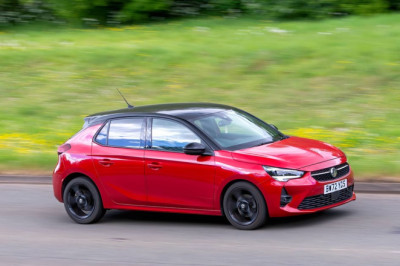
Motorists buying new electric family cars are now likely to be stung by a £2,125 'luxury' tax as part of wholesale changes to Vehicle Excise Duty (VED) that industry insiders warn threatens to slow the transition to EVs at a 'critical time'.
Under revamped car tax rules announced by the previous Tory Government and ushered in by Labour, electric cars are no longer exempt from VED.
But as well as having to pay a £10 'showroom tax' when new and a £195 standard rate every year thereafter, EVs priced over £40,000 will also be levied with the 'expensive car supplement'.
The supplement, a premium tax first introduced in 2017, has until now only applied to petrol, diesel and hybrid cars priced over £40,000.
Experts say the likelihood of EV buyers paying this luxury tax is far greater, with the price of seven in ten new EVs entering the road exceeding the £40k threshold.
In fact, Auto Trader has warned that EV buyers are three times as likely to be hit with the supplement than those purchasing cars with combustion engines.
Some manufacturers have responded to the supplement in recent days by slashing prices so their electric models fall just below the £40,000 threshold.
Motorists buying new family EVs are NOW likely to be stung by a £2,125 'luxury' car tax as part of a huge shake-up to Vehicle Excise Duty introduced from 1 April 2025
Until now, EVs have been exempt from all VED charges, including the expensive car supplement.
However, new rules introduced by Chancellor Rachel Reeves mean drivers purchasing an EV with a list price of more than £40,000 will - like buyers of pricier petrol and diesel cars - also incur the financial wrath of a luxury tax.
The supplement is £425 paid annually on top of the standard rate of £195 from years two to six after a car is registered. If the EV is sold to another driver, they will incur this additional cost.
It means buyers of new EVs after 1 April 2025 will not feel the impact of the supplement until 2026.
But it will be sizable when it eventually kicks in.
It will take the total annual VED outlay to an eye-watering £620 - or £3,100 in total over a five-year period of ownership.
The supplement has been dubbed a 'Tesla tax' by EV owners and industry insiders, given that new cars sold by the popular US maker typically exceed the £40k threshold.
While entry-spec Kia Niro EVs sit just below the expensive car supplement threshold of £40,000, adding a few optional extras - like metallic paint and a better sound system - could push it into the luxury car bracket
The Volkswagen ID.3 is an electric family hatchback that starts from just under £31k. But higher spec versions with additional equipment could be subject to a premium tax originally intended for luxury cars
The move has received an industry-wide backlash, with members of the automotive sector questioning why the £40,000 barrier for the supplement hasn't been increased for EVs, given they are typically around £10,000 more expensive than an equivalent petrol due to the cost of batteries that power them.
Ginny Buckley, founder of EV-dedicated website Electrifying.com, said the failure to update the 'outdated luxury car tax threshold' is 'yet another sign of poor leadership in the transition to electric vehicles'.
She added: 'Many family-sized electric cars – such as the Kia e-Niro or Volkswagen ID.3 – could be subject to a tax originally intended for luxury vehicles.
'Family drivers needing extra space, and businesses requiring longer range, could end up paying thousands more in tax over six years.
'This may discourage car buyers from making the switch to electric.'
Another major concern with the expensive car supplement is that it isn't based on the price customers pay after negotiating discounts and the addition of optional extras - such as metallic paint - could push a sub-£40k model over the threshold.
This is because the VED rules for the supplement are based on a car's recommended retail price (RRP) inclusive of options.
Auto Express calculates that seven in ten new electric vehicles will be subject to the expensive car tax because most EVs cost over £40,000 new
The expensive car supplement for EVs has been dubbed a 'Tesla tax' because all but one vehicle from the US brand costs more than £40k

Auto Trader says 56 per cent of the electric cars up to five years old on its site have a list price in excess of £40,000.
For those in the same age range with a petrol or diesel engine, the percentage is just 16 per cent.
Ian Plummer, commercial director of Auto Trader, blasted the move, describing it as the wrong time to give consumers 'additional reasons not to make the switch' to electric motoring.
He added: 'Despite the more uncertain global climate, it makes sense to delay these duty increases to ward off the risk of harming attitudes towards EVs for the sake of a marginal gain in revenues for the Treasury.
'EVs up to five years old on our site are three-and-a-half times more likely to be hit by the expensive car supplement than internal combustion engine cars in the same age range.
'That kind of difference is unhelpful for efforts to persuade drivers to switch.'
Chris Rosamond, current affairs and features editor at Auto Express, said DVLA records show that almost a third (31 per cent) of new cars are already subject to the expensive car supplement - and that going forward, it will hit up to 70 per cent of new EVs sold.
'Levying what is basically a tax set on petrol cars eight years ago onto EVs today is unfair, especially when you consider the large sums involved.
'With private EV uptake already struggling and cost being one of the main deterrents for potential buyers, this change risks slowing adoption at a critical time.
'The Government should be supporting drivers in making the switch to EVs, not penalising them.'
Vauxhall has become the latest car brand to react to the luxury tax by updating its price lists to ensure every one of its electric cars now sit below he £40,000 threshold. Both the Grandland Ultimate and Astra ST Ultimate EVs have had their RRPs adjusted to £39,995
Abarth - the sporty Italian spin-off brand of Fiat - has also slashed the price of one of its most expensive EVs to dodge the new luxury tax on electric cars














